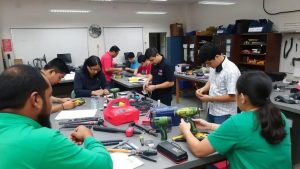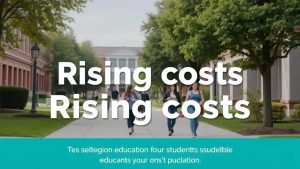Alternative post-secondary pathways that could change your future

Anúncios
Alternative post-secondary pathways include vocational training, online courses, and bootcamps, providing practical education options tailored to individual interests and career goals, leading to successful job placements and personal growth.
Alternative post-secondary pathways can open doors to exciting opportunities beyond traditional college. Have you ever considered how these options might fit your career goals? Let’s explore the many directions you can take!
Anúncios
Understanding alternative pathways
Understanding alternative pathways can help you discover exciting options for your education and career. These pathways provide unique opportunities beyond traditional college routes.
Types of Alternative Pathways
There are numerous alternatives to the conventional post-secondary education system. Some popular options include:
Anúncios
- Vocational training programs
- Trade schools
- Online courses
- Bootcamps for skills like coding
Each of these pathways offers a different approach to learning that can cater to various interests and career goals. With a focus on practical skills, alternative education provides hands-on experiences that prepare students for specific jobs.
Flexible Learning Options
One of the best aspects of alternative pathways is their flexibility. Many programs allow you to learn at your own pace and fit your study schedule around your life. This can be especially beneficial for those who work or have other commitments.
Additionally, many alternative programs emphasize real-world applications, which can make learning more engaging. Rather than just theoretical knowledge, students gain skills that are directly applicable to their chosen fields.
Consider Your Goals
When choosing an alternative pathway, it’s crucial to consider your career goals. Ask yourself:
- What skills do I want to acquire?
- What is my desired career?
- How much time can I commit to my education?
- Am I open to online learning or prefer in-person classes?
Remember that the right pathway is one that aligns with your interests and future aspirations. Exploring these alternatives can significantly impact your career trajectory.
Benefits of choosing alternative education

Choosing alternative education comes with a host of benefits that can greatly enhance your learning experience. These alternatives often cater to individual learning styles, making education more accessible and enjoyable.
Personalized Learning Experience
In alternative education, students often receive a more personalized approach. This means that lessons can be tailored to fit their specific needs and interests. With smaller class sizes in many programs, instructors can focus on each student, providing the support needed to thrive.
- Individualized attention and support
- Curricula tailored to interests
- Flexible learning schedules
- Creative and engaging teaching methods
This tailored approach helps students feel more involved in their education, which can boost motivation and retention of information.
Real-World Skills
Another significant benefit of alternative education is the focus on real-world skills. Many programs emphasize practical, hands-on experiences that prepare students for the workforce. Instead of just theoretical knowledge, students learn how to apply their skills in real-life situations.
For example, vocational training and trade schools often provide direct experience in fields like plumbing, electrical work, or culinary arts. This immediate application boosts confidence and competence.
Cost-Effective Options
Alternative education can also be more affordable than traditional college routes. Many programs have lower tuition fees and offer quicker pathways to employment. This means students can enter the workforce sooner, reducing debt and gaining valuable experience.
Additionally, many online courses and bootcamps allow students to learn at their own pace, sometimes at a fraction of the cost of traditional institutions. This financial advantage makes alternative pathways an appealing choice for many.
Popular non-traditional programs
Exploring popular non-traditional programs can lead you to various exciting educational opportunities. These programs cater to different interests and career aspirations, providing unique paths for learners.
Vocational Training
Vocational training programs focus on teaching specific trades and skills. They prepare students for the workforce in fields like:
- Healthcare, such as nursing and dental hygiene
- Crafts, including carpentry and plumbing
- Culinary arts, offering cooking and restaurant management skills
- Technology, covering areas like IT support and web development
These programs allow students to gain hands-on experience quickly and often lead directly to employment.
Online Learning Platforms
Online learning is another popular non-traditional option. Platforms like Coursera, Udemy, and Khan Academy offer a variety of courses on different subjects. Students can learn from home at their own pace, which is ideal for those balancing work or family commitments.
These courses cover everything from business management to software development. Many programs even offer certificates that can boost your resume.
Bootcamps
Bootcamps have gained popularity for their intensive, short-term programs, particularly in technology fields. They focus on skills like coding, data analysis, and digital marketing. With a strong emphasis on practical application, students often complete projects that showcase their skills to potential employers.
Bootcamps typically last a few months and can lead to job placements, making them an attractive option for a quick career change.
Portfolio-Based Learning
In recent years, portfolio-based learning has emerged as a dynamic educational approach. Students create portfolios that showcase their work, designs, or projects. This method allows for creativity and personal expression while emphasizing practical skills.
Portfolio learning is especially popular in fields like graphic design, photography, and writing, helping students stand out in job markets.
How to choose the right pathway for you

Choosing the right pathway can be a significant step in your educational journey. With so many options within alternative pathways, it’s essential to evaluate what fits your personal goals and interests.
Assess Your Interests and Strengths
Begin by reflecting on your interests and strengths. Think about what subjects excite you or what activities you enjoy. Understanding your passions can help guide your decision.
- Make a list of your hobbies and interests.
- Consider skills you excel at or enjoy using.
- Think about the kinds of jobs you see yourself in.
This self-assessment can help narrow down the pathways that align with your natural inclinations.
Research Different Options
After identifying your interests, research the various alternative education options available. Look into vocational training, online courses, bootcamps, and more. Each offers unique benefits, so gathering information is crucial.
Visit websites, attend informational sessions, and talk to current students or graduates to understand what each program entails. This firsthand insight can provide clarity.
Consider Your Learning Style
Your learning style plays a key role in choosing a pathway. Some people thrive in hands-on environments, while others prefer theoretical knowledge. Knowing how you learn best can help you find a suitable program.
For example, if you enjoy practical experience, vocational training might be ideal. On the other hand, if you are comfortable with self-paced online learning, explore online platforms and courses.
Evaluate Time and Financial Commitment
Consider how much time and money you can commit to your education. Some programs take longer and are more costly, while others offer quick, cost-effective options. Assess your daily schedule and budget to make an informed decision.
Look for scholarships or financial aid for programs that seem more expensive. Many alternative pathways now provide financial options accessible to students.
Success stories of alternative education graduates
Success stories of alternative education graduates highlight the positive outcomes of choosing non-traditional pathways. Many individuals have found fulfilling careers and life-changing opportunities through these options.
Real-Life Examples
Take Sarah, for instance. After completing a coding bootcamp, she secured a job as a software developer in just a few months. Sarah initially thought college was not for her, but the hands-on approach of the bootcamp helped her discover her passion for technology.
Similarly, Mark pursued vocational training in plumbing. He enjoyed working with his hands and solving problems. After graduation, Mark landed a high-paying job that allowed him to support his family comfortably.
Impact on Career Trajectories
Many graduates from alternative programs express that their educational journeys significantly impacted their career trajectories. An example is Lisa, who completed an online course in digital marketing. Within a year, she started her own successful consultancy, enabling her to work with clients worldwide.
These stories prove that alternative education can lead to impressive career transformations, allowing individuals to thrive in their chosen fields.
Personal Growth and Confidence
Beyond just career achievements, graduates often report increased personal growth and confidence. Taking a non-traditional path helps students build resilience, critical thinking, and problem-solving skills. For example, David, a graduate from a culinary arts program, not only improved his cooking skills but also gained confidence to open his own restaurant.
Such success stories reinforce the idea that alternative education is a viable path for many who seek different learning experiences.
Future trends in alternative post-secondary education

The landscape of alternative post-secondary education is constantly evolving. As society changes, so do the methods and offerings in education. Understanding these future trends is essential for students and educators alike.
Increased Online Learning Opportunities
One significant trend is the rise of online learning platforms. More students are opting for courses taught via the internet, which allows for greater flexibility and accessibility. Programs are being designed to be more interactive and engaging, utilizing advanced technology.
- Enhanced virtual classrooms with live discussions.
- Utilization of simulations and virtual reality for practical skills.
- Collaboration with industry leaders to ensure relevant curricula.
These innovations make online education a popular choice for students from diverse backgrounds.
Emphasis on Skills-Based Learning
Another trend is the emphasis on skills-based learning rather than traditional academic achievements. Many employers now value practical skills and real-world experience more than formal degrees. Programs that focus on teaching specific skills that can be directly applied in the workplace are in high demand.
Examples include coding bootcamps, trade schools, and programs teaching emerging technologies. Graduates from these programs often find it easier to secure jobs, as they have the skills employers want.
Partnerships with Industry
Educational institutions are increasingly forming partnerships with companies and organizations. These collaborations can lead to internships, mentorship opportunities, and hands-on training experiences for students. Such partnerships ensure that the education offered is aligned with industry needs.
Changing workforce demands influence how programs are developed. Institutions that adapt quickly will provide their students with the best chances of success.
Focus on Lifelong Learning
The concept of lifelong learning is also becoming popular as job markets change rapidly. More adults are returning to education to upskill or reskill throughout their careers. This trend is leading to the creation of shorter courses and flexible learning options that cater to working professionals.
Such opportunities help individuals stay relevant in their fields and can enhance career advancement prospects.
In conclusion, alternative post-secondary pathways offer diverse options for those seeking non-traditional education. These pathways, such as vocational training and online courses, cater to different learning styles and career goals. As the landscape of education continues to evolve, more students are finding success in these programs. Embracing the changes can lead to fulfilling careers and personal growth. The future of education is bright, and opportunities abound for those ready to explore.
FAQ – Frequently Asked Questions about Alternative Post-Secondary Pathways
What are alternative post-secondary pathways?
Alternative post-secondary pathways are non-traditional education options, such as vocational training, online courses, and bootcamps, that provide practical skills and experiences.
How can I choose the right alternative educational program?
Consider your interests, learning style, and career goals. Research different programs and evaluate their flexibility and costs.
Are online learning options effective?
Yes, online learning can be very effective. Many programs are designed to be interactive and engaging, allowing for a flexible study schedule.
What are the benefits of vocational training?
Vocational training often leads to practical skills that are in high demand, shorter program durations, and direct pathways to employment in various trades.






